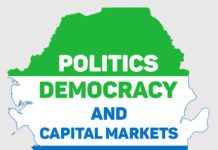by Mahmud Tim Kargbo
27th April 2021
We are on the 60th anniversary of our Independence. Sixty years is a long time in the life of man – indeed, it is more than the average Sierra Leonean life expectancy today. Since life expectancy was longer at the time of Independence, it is safe to say that most Sierra Leoneans born just after independence are now no more. It is useful to take stock at such a time. Did we achieve the dreams of our right-minded founding fathers for freedom’s first children? Or have we fallen woefully short? What more do we need to do? Are our rulers ruling us wisely as per our natural resources and population?
Clearly, our right-minded founding fathers wanted political freedom for the people of Sierra Leone – freedom to determine who we would be governed by, as well as freedom of thought, expression, belief, faith, and worship. They wanted justice and equality, of status and opportunity. And they wanted us to be free from poverty.
We have not made substantial progress in achieving political freedom. Our democracy is not matured, but with people confidently choosing to vote out governments that lose touch with their needs is much better. Our institutions protecting the freedom to vote is growing stronger, with the Election Commission and the forces of law and order ensuring free and largely fair elections throughout the country to some extent. Though with cries from the losers always. Political parties, NGOs, the press, and individuals aren’t exerting checks and balances on public policy. Judiciary and the Parliament have not taken important steps to protect individual freedom in Sierra Leone.
Our economy is also far poorer than it was at the time of independence and poverty has come up substantially. Of course, some countries like Ivory Coast, Ghana or Senegal that were not even in a similar situation are far better off today. Indeed, one of the advantages of a vibrant democracy is that it gives people an eject button which prevents governance from getting too bad. Democracy has probably ensured more stable and equitable economic growth than an authoritarian regime might have in Sierra Leone.
Yet a dispassionate view of both our democracy and our economy would suggest some concerns. Even as our politicians would have us believe that our democracy and economy have become more vibrant, an important issue still is whether we have substituted the crony socialism of the past with crony capitalism, where the rich and the influential are alleged to have received land, natural resources and spectrum in return for payoffs to venal politicians. By killing transparency and competition, crony capitalism is harmful to free enterprise, opportunity, and economic growth. And by substituting special interests for the public interest, it is harmful to democratic expression. If there is some truth to these perceptions of crony capitalism, a natural question is why people tolerate it. Why do they vote for the venal politician who perpetuates it?
One widely held hypothesis on the persistence of crony capitalism is that our country suffers from the want of a “few good men” in politics. This view is fair enough to the many down-standing people in politics. True this is, but every so often we see the emergence of a group, usually upper-middle-class professionals, who want to clean up politics in Sierra Leone. But when these “good” people stand for election, they tend to lose their deposits. Does the electorate really not want a squeaky clean government?
Apart from the conceit that high morals lie only with the upper-middle class, the error in this hypothesis may be in believing that problems stem from individual ethics rather than the system we have. In a speech I made in 2014, before the Young African Leaders summit, I argued that the tolerance for the venal politician is because he is the crutch that helps the poor and underprivileged navigate a system that gives them so little access. This may be why he survives.
Let me explain. Our provision of public goods is unfortunately biased against access by the poor. Teachers do not show up in a timely manner at poor schools to teach; The police do not register crimes, or encroachments, especially if committed by the rich and powerful; Public hospitals are not adequately staffed or equipped and ostensibly free medicines for the free medical care are not available at the dispensary; …I can go on, but you know the all-too-familiar picture.
This is where the crooked but savvy politician in our country fits in. While the poor do not have the money to “purchase” public services that are their right, they have a vote that the politician wants. The politician does a little bit to make life a little more tolerable for his poor constituents – a government job here, a political Party registered centre there, a land right honoured somewhere else. For this, he gets the gratitude of his voters, and more importantly, their vote.
Of course, there are few politicians who are honest and genuinely want to improve the lot of their voters. But the system tolerates corruption because the street smart politician is better at making the wheels of the bureaucracy creak, however slowly, in favour of his constituents. And such a system is self-sustaining. An idealist who is unwilling to “work” the system can promise to reform it, but the voters know there is little one person can do. Moreover, who will provide the patronage while the idealist is fighting the system? So why not stay with the fixer you know even if it means the reformist loses his deposit?
So the circle is complete. The poor and the under-privileged need the politician to help them get jobs and public services. The crooked politician needs the businessman to provide the funds that allow him to supply patronage to the poor and fight elections. The corrupt businessman needs the crooked politician to get public resources and contracts cheaply. And the politician needs the votes of the poor and the underprivileged. Every constituency is tied to the other in a cycle of dependence, which ensures that the status quo prevails.
Well-meaning political leaders and governments have tried, and are trying, to break this vicious cycle. How do we get more politicians to move from “fixing” the system to reforming the system? The obvious answer is to either improve the quality of public services or reduce the public’s dependence on them. Both approaches are necessary.
But then how does one improve the quality of public services? The typical answer has been to increase the resources devoted to the service and to change how it is managed. A number of worthwhile paper works to improve the quality of public education and healthcare, but nothing positive to write home about. But if resources leak or public servants are not motivated, which is likely in the worst governed regions, these interventions are not very effective.
Some have argued that making a public service a right can change delivery. It is hard to imagine that simply legislating rights and creating a public expectation of delivery will, in fact, ensure delivery. After all, is there not an expectation that an Ebola survivor cardholder or a mother of a five years kid will get decent treatment from the fair welfare treatment, yet all too frequently this is not available or is of poor quality.
Information decentralisation can help. Knowing how many medicines the local public dispensary received, or how much money the local school is getting as subsidies, can help the public monitor delivery and alert higher-ups when the benefits are not delivered. But the public delivery system is usually most apathetic where the public is poorly educated, of low social status, and disorganised, so monitoring by the poor is also unlikely to be effective.
Some argue that this is why the middle class should enjoy public benefits along with the poor so that the former can protest against poor delivery, which will ensure high quality for all. But making benefits universal is costly, and may still lead to indifferent delivery for the poor. The middle class may live in different areas from the poor. Indeed, even when located in the same area, the poor may not even patronise facilities frequented by the middle class because they feel out of place. And even when all patronise the same facility, providers may be able to discriminate between the voluble middle class and the uncomplaining poor.
So if more resources or better management are inadequate answers, what might work? The answer may partly lie in reducing the public’s dependence on government-provided jobs or public services. A good private-sector job, for example, may give a household the money to get private healthcare, education, and supplies, and reduce their need for public services. Income could increase an individual’s status and increase the respect they are accorded by the teacher, the policeman or the bureaucrat.
But how does a poor man get a good job if he has not benefited from good healthcare and education in the first place? In this modern world where good skills are critical to a good job, the unskilled have little recourse but to take a poorly-paying job or to look for the patronage that will get them a good job. So do we not arrive at a contradiction: the good delivery of public services is essential to escape the dependence on bad public services?
Money liberates and Empowers…
We need to go back to the drawing board. There is a way out of this contradiction, developing the idea that money liberates. Could we not give poor households cash instead of promising them public services? A poor household with cash can patronise whomsoever it wants and not just the monopolistic government provider. Because the poor can pay for their medicines or their food, they will command respect from the private provider. Not only will a corrupt fair price shop owner not be able to divert the rice he gets since he has to sell at market price, but because he has to compete with the shop across the street, he cannot afford to be surly or lazy. The government can add to the effects of empowering the poor by instilling a genuine cost to being uncompetitive – by shutting down parts of the public delivery systems that do not generate enough custom.
Much of what we need to do is already possible. The government on so many occasions announced a scheme for full financial inclusion. However, it failed to identify the poor, creating unique biometric identifiers for them, opening linked bank accounts, and making government transfers into those accounts. When fully rolled out, I believe it will give the poor the choice and respect as well as the services they had to beg for in the past. It can even break a link between poor public service, patronage, and corruption that is growing more worrisome over time.
Undoubtedly, cash transfers will not resolve every problem, nor are they uncontroversial. A constant refrain from paternalistic social workers is that the poor will simply drink away any transfers. Moreover, one could experiment with sending transfers to women, who may be better spenders. Some argue that attaching conditions to cash transfers – for example, they will be made provided the recipient’s children attend school regularly – may improve the usage of the cash. The danger of attaching conditionality is that if the monitor is corrupt or inefficient, the whole process of direct benefits transfers can be vitiated. Nevertheless, it will be useful to monitor usage carefully where automation is possible, and automatically attach further benefits to responsible usage.
A related concern is whether cash transfers will become addictive – whether they become millstones keeping the poor in poverty rather than stepping stones out of it. This is an important concern. Cash transfers work best when they build capabilities through education and healthcare, thus expanding opportunity, rather than when they are used solely for inessential consumption. The vast majority amongst the poor will seize opportunities, especially for their children, with both hands. Nevertheless, if there is evidence that cash transfers are being misspent – and we should let data rather than pre-conceived notions drive policy — some portion could be given in the form of electronic coupons that can be spent by the specified recipient only on food, education or healthcare.
Another set of concerns has to do with whether private providers will bother to provide services in remote areas. Clearly, if people in remote areas have the cash to buy, private providers will find their way there. Indeed, a particularly desirable outcome will be if some of the poor find work providing services that hitherto used to be provided by public servants. Moreover, implementing cash transfers does not mean dismantling the system of public delivery wherever it is effective – it only means that the poor will pay when they use the public service.
The broader takeaway is that financial inclusion and direct benefits transfer can be a way of liberating the poor from dependency on indifferently delivered public services, and thus indirectly from the venal but effective politician. It is not a cure-all but will help the poor out of poverty and towards true political independence. But financial inclusion can do more; by liberating the poor and the marginalised from the clutches of the moneylender, by providing credit and advice to the entrepreneurial amongst the poor, and by giving household the ability to save and insure against accidents, it can set them on the road to economic independence, thus strengthening the political freedom that good public services will bring. This is why financial inclusion is so important.

Mahmud Tim Kargbo



